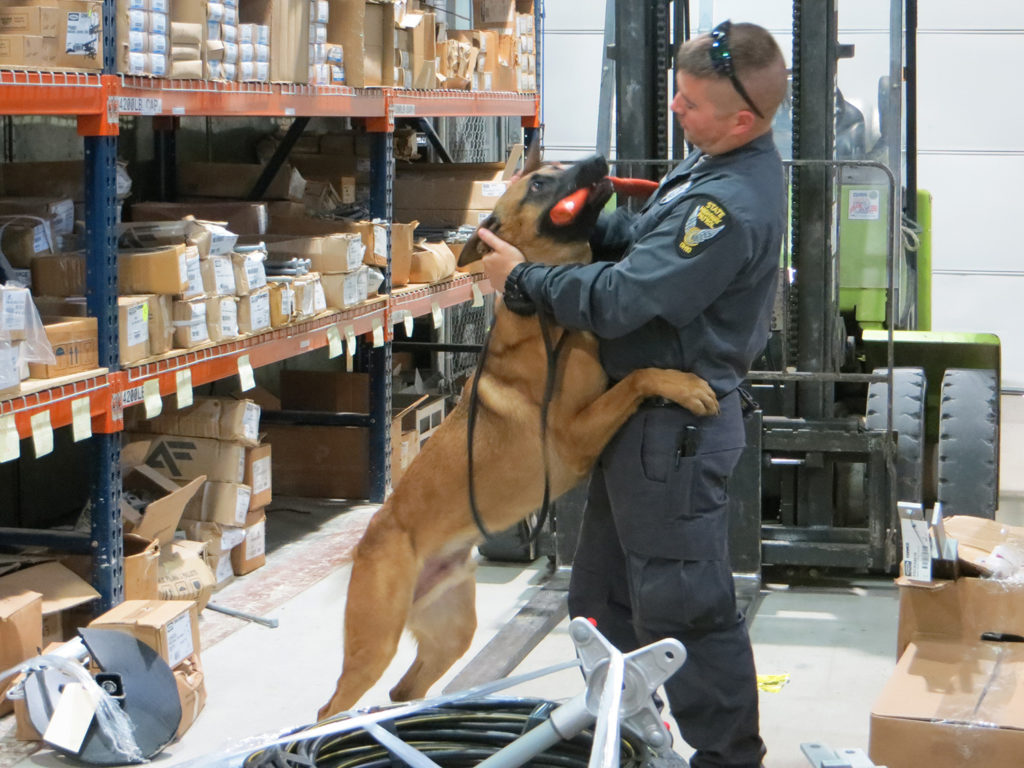
If you’re at the Buckeye Rural Electric Cooperative warehouse and you encounter a few German shepherds, feel free to look, but don’t touch.
The animals are on official business, practicing their sniffing skills as bomb and narcotics detectors with their handlers at the co-op’s headquarters in Rio Grande, Ohio. The warehouse’s hustle and bustle make it the perfect training ground for the Ohio State Highway Patrol’s canine units.
“I use other facilities as well, but what’s nice about Buckeye is that there are so many places to hide stuff for the handlers and dogs,” said Sgt. Stoney Johnson, who runs the patrol’s canine training program. “Because it’s a warehouse, there are parts and pieces and people around and it’s just more realistic…it’s a business that’s lived in continuously. And it’s heated. If the weather is bad, we can get in there and work.”
The arrangement between Buckeye REC and the Ohio State Highway Patrol stems from the co-op’s Matt Hall, a past volunteer with the patrol’s reserves. The experience, he said, had a lasting impact on him.
“One time we pulled over a car with a 17-year-old girl in it,” said Hall, who said the teen told him she started taking drugs when she was 12. “That really got me to thinking because at the time my girls were 14 and 16, and I thought, ‘You know, this could be my girls.’ From then on, I want to do everything I can to help get drugs off the street.”
Hall, a senior lineworker, kept in touch with Johnson. When more indoor training facilities for the dogs were needed, Hall went to the top—and got an immediate yes.
“It’s an opportunity to open our space, to allow these wonderful animals to be trained,” said Tonda Meadows, Buckeye REC’s general manager and CEO. “You feel like you have to help. This is a small community and everybody is very close. Unfortunately, many families are affected by the tragedies caused by illegal drug use.”
The patrol has its own facility in Marysville, but the dogs need a variety of “real-life” environments to keep sharp while fulfilling federal requirements of 16 hours of training each month.
“Continuous training ensures dogs’ reliability. You can’t be depriving people of their rights because of bad equipment,” said Johnson.
The canine program is open to other jurisdictions, too. By Johnson’s reckoning, about 50 to 60 dogs from local, state and county law enforcement have completed the 10-week training program during the past three to four years.
To simulate real-life conditions as much as possible, dog handlers tuck explosives and bags of illicit drugs among the boxes and bags lining the warehouse’s shelves and vehicles. The teams come as often as a few times a week, said Hall, noting that sessions are short and don’t disrupt co-op operations.
“It feels good that we can provide the training here,” said Hall. “It’s a big thing for them to have a place like this.”
Victoria A. Rocha is a staff writer at NRECA